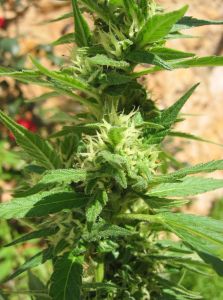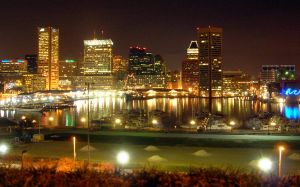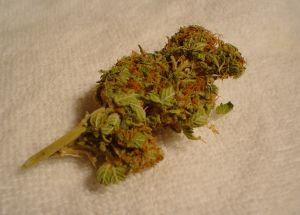 A variety of new Maryland laws are set to go into effect on Monday, October 1st. Many of these new Maryland laws are part to the criminal justice system, most notably the Maryland marijuana possession law. After years of lobbying by marijuana legalization groups, the Maryland state legislature finally voted to change the state’s harsh marijuana possession laws. Starting on Monday, the maximum penalty for simple possession of marijuana will be lowered from 1 year in jail to 90 days in jail, and the maximum fine will be lowered from $1,000 to $500. Simple possession of marijuana is possession of less than 10 grams of the controlled substance. Pressure from pro marijuana lobbyist groups was not the only reason that the legislature and governor agreed with the new marijuana penalties. The legislature was also swayed by proponents of a more streamlined judicial system.
A variety of new Maryland laws are set to go into effect on Monday, October 1st. Many of these new Maryland laws are part to the criminal justice system, most notably the Maryland marijuana possession law. After years of lobbying by marijuana legalization groups, the Maryland state legislature finally voted to change the state’s harsh marijuana possession laws. Starting on Monday, the maximum penalty for simple possession of marijuana will be lowered from 1 year in jail to 90 days in jail, and the maximum fine will be lowered from $1,000 to $500. Simple possession of marijuana is possession of less than 10 grams of the controlled substance. Pressure from pro marijuana lobbyist groups was not the only reason that the legislature and governor agreed with the new marijuana penalties. The legislature was also swayed by proponents of a more streamlined judicial system.
Possession of marijuana cases have been clogging the district court dockets in Maryland for years, especially in densely populated jurisdictions such as Baltimore City, Baltimore County, and Prince George’s County. But in the past, many of these simple marijuana possession cases would also end up clogging the circuit court dockets as well. By lowering the maximum penalty for possession of marijuana to 90 days, a defendant is no longer allowed to demand a trial by jury in the circuit court, and starting October 1st possession of marijuana cases will for the most part begin and end in district court. Under the Maryland rules of criminal procedure a defendant may only demand a jury trial if he or she is facing more than 90 days incarceration. The new marijuana possession laws may seem like a victory for marijuana legalization supporters, but losing the right to a jury trial could prove to be a significant detriment to a possession of marijuana defendant who decides to fight his or her charges. Demanding a jury trial in a possession of marijuana case was not only a means to guarantee due process, but also a significant bargaining chip that a defense lawyer could use to earn a better negotiated offer from the state prosecuting lawyer.
Continue reading →
 Criminal Defense Lawyer Blog
Criminal Defense Lawyer Blog


 The ongoing battle marijuana to legalize marijuana in America and in Maryland took another hit recently as Federal prosecutors have increased efforts to crackdown on medical marijuana dispensaries. This latest crackdown effort came at the hands of Federal lawyers and court papers rather than with the search warrants and guns of the DEA and FBI. No arrests were made in any of the latest anti marijuana push, but a strong message has been sent across the country that the Feds are not ready to reverse their position on marijuana legalization.
The ongoing battle marijuana to legalize marijuana in America and in Maryland took another hit recently as Federal prosecutors have increased efforts to crackdown on medical marijuana dispensaries. This latest crackdown effort came at the hands of Federal lawyers and court papers rather than with the search warrants and guns of the DEA and FBI. No arrests were made in any of the latest anti marijuana push, but a strong message has been sent across the country that the Feds are not ready to reverse their position on marijuana legalization.  Annapolis police have arrested a 19 year old Maryland man in one of the largest drug busts in Anne Arundel County this year. Police received tips from community sources, as well as their own investigations in order to secure a search warrant that ultimately led to the seizure of nearly $30,000 worth of heroin, stacks of cash, and marijuana. Police also seized two handguns from the Maryland man’s house. Closer examination of the guns back at the Annapolis police department revealed that the firearms, a 9mm Beretta and a Smith and Wesson, were in fact stolen. Police did not reveal how much marijuana was seized from the Maryland residence, but closer inspection of the heroin revealed 140 grams of high grade heroin packaged for sale. Annapolis police are still investigating possible sources of the heroin. At the current time, police have not arrested a supplier, but more arrests stemming from this bust could be imminent. The Maryland man was arrested on 5 separate CDS drug counts including narcotics possession, possession of drugs with intent to distribute, and possession of drug paraphernalia. Bail was set at $40,000, which was posted soon after the arrest.
Annapolis police have arrested a 19 year old Maryland man in one of the largest drug busts in Anne Arundel County this year. Police received tips from community sources, as well as their own investigations in order to secure a search warrant that ultimately led to the seizure of nearly $30,000 worth of heroin, stacks of cash, and marijuana. Police also seized two handguns from the Maryland man’s house. Closer examination of the guns back at the Annapolis police department revealed that the firearms, a 9mm Beretta and a Smith and Wesson, were in fact stolen. Police did not reveal how much marijuana was seized from the Maryland residence, but closer inspection of the heroin revealed 140 grams of high grade heroin packaged for sale. Annapolis police are still investigating possible sources of the heroin. At the current time, police have not arrested a supplier, but more arrests stemming from this bust could be imminent. The Maryland man was arrested on 5 separate CDS drug counts including narcotics possession, possession of drugs with intent to distribute, and possession of drug paraphernalia. Bail was set at $40,000, which was posted soon after the arrest. A Maryland man was arrested for multiple drug charges after police used a search warrant to raid his Ann Arundel County home. Ann Arundel police executed the search warrant and discovered approximately 46 marijuana plants, which ranged from 5 to 6 feet tall. Police did not release the exact details of what led them to the 53 year old man’s home, but police did say that residents of the neighborhood had voiced to concerns to cops about possible drug activity going on in the house. According to police, the Maryland man was arrested for 9 drug charges including manufacturing marijuana, possession of marijuana with intent to distribute, and possession of marijuana. Manufacturing marijuana and possession of marijuana with intent to distribute are both felonies, while possession of marijuana is a misdemeanor. Police did not indicate whether they had any concrete evidence that the Maryland homeowner was actually dealing drugs, or if the marijuana grow operation was simply for personal use. According to police, the marijuana would eventually have a street value of over 50 thousand dollars once the marijuana was harvested.
A Maryland man was arrested for multiple drug charges after police used a search warrant to raid his Ann Arundel County home. Ann Arundel police executed the search warrant and discovered approximately 46 marijuana plants, which ranged from 5 to 6 feet tall. Police did not release the exact details of what led them to the 53 year old man’s home, but police did say that residents of the neighborhood had voiced to concerns to cops about possible drug activity going on in the house. According to police, the Maryland man was arrested for 9 drug charges including manufacturing marijuana, possession of marijuana with intent to distribute, and possession of marijuana. Manufacturing marijuana and possession of marijuana with intent to distribute are both felonies, while possession of marijuana is a misdemeanor. Police did not indicate whether they had any concrete evidence that the Maryland homeowner was actually dealing drugs, or if the marijuana grow operation was simply for personal use. According to police, the marijuana would eventually have a street value of over 50 thousand dollars once the marijuana was harvested. Enforcing Maryland marijuana laws is still a top priority for law enforcement agencies throughout the state, but public sentiment about the drug may be changing the way police look at marijuana cases. Marijuana arrests still account for the majority of all drug arrests throughout Maryland, and in most jurisdictions the ratio of marijuana arrests to other drug arrests is not even close. For example, in Montgomery County 67 percent of all drug possession arrests were for marijuana possession in 2011, and a staggering 74 percent of all drug possession arrests were for marijuana in 2010. These numbers would be even higher if all drug cases processed by Montgomery County Police were included, because a large number of marijuana possession defendants are not arrested, but rather are issued citations for the crime. In contrast, suspects caught by police with other drugs such as cocaine or heroin are almost always arrested at the crime scene. So far in 2012 the percentage of marijuana arrests to all drug arrests has fallen slightly to 63 percent. The question being asked now is whether this percentage will continue to drop as Maryland citizens and Maryland lawmakers become more tolerant of marijuana use.
Enforcing Maryland marijuana laws is still a top priority for law enforcement agencies throughout the state, but public sentiment about the drug may be changing the way police look at marijuana cases. Marijuana arrests still account for the majority of all drug arrests throughout Maryland, and in most jurisdictions the ratio of marijuana arrests to other drug arrests is not even close. For example, in Montgomery County 67 percent of all drug possession arrests were for marijuana possession in 2011, and a staggering 74 percent of all drug possession arrests were for marijuana in 2010. These numbers would be even higher if all drug cases processed by Montgomery County Police were included, because a large number of marijuana possession defendants are not arrested, but rather are issued citations for the crime. In contrast, suspects caught by police with other drugs such as cocaine or heroin are almost always arrested at the crime scene. So far in 2012 the percentage of marijuana arrests to all drug arrests has fallen slightly to 63 percent. The question being asked now is whether this percentage will continue to drop as Maryland citizens and Maryland lawmakers become more tolerant of marijuana use. In the past few years the Maryland legislature has weakened its stance on the prosecution of marijuana possession cases. This trend began with the passing of laws that allow defendants charged with possession of marijuana to assert the legal defense of medical necessity. The Maryland legislature also went on to pass a law that will decrease the maximum jail sentence that a defendant charged with a first offense of possession of marijuana can receive. Come October, a first offense for marijuana possession will carry a 60 day maximum jail sentence rather than the scarcely used 1 year maximum jail sentence. Surprisingly though, the Maryland legislature has remained silent on the issue of synthetic marijuana.
In the past few years the Maryland legislature has weakened its stance on the prosecution of marijuana possession cases. This trend began with the passing of laws that allow defendants charged with possession of marijuana to assert the legal defense of medical necessity. The Maryland legislature also went on to pass a law that will decrease the maximum jail sentence that a defendant charged with a first offense of possession of marijuana can receive. Come October, a first offense for marijuana possession will carry a 60 day maximum jail sentence rather than the scarcely used 1 year maximum jail sentence. Surprisingly though, the Maryland legislature has remained silent on the issue of synthetic marijuana.  A Baltimore City police officer was recently charged with assault after being involved in an altercation in Harford County, Maryland. The exact facts surrounding the altercation are in dispute, but the Baltimore police officer certainly has an interesting explanation for how he became involved in the assault. The criminal charging document alleges that the 10 year Baltimore police veteran, who was off duty at the time, approached a parked vehicle with two occupants seated inside. The police officer was apparently yelling at the occupants to stop dealing drugs, and approached the car in a threatening manner despite not seeing any actual drug transaction taking place.
A Baltimore City police officer was recently charged with assault after being involved in an altercation in Harford County, Maryland. The exact facts surrounding the altercation are in dispute, but the Baltimore police officer certainly has an interesting explanation for how he became involved in the assault. The criminal charging document alleges that the 10 year Baltimore police veteran, who was off duty at the time, approached a parked vehicle with two occupants seated inside. The police officer was apparently yelling at the occupants to stop dealing drugs, and approached the car in a threatening manner despite not seeing any actual drug transaction taking place.  The recent movement to legalize medical marijuana in Maryland has been gaining steam each year, and the state legislature is slowly moving toward joining 17 other states and Washington D.C. as medical marijuana states. Although there is no medical marijuana bill currently being debated, the Maryland legislature is trending in the medical marijuana direction, as evidenced by recent bills that have modified state marijuana laws. Just last year, the Maryland governor signed off on a law that effectively decriminalizes marijuana use provided that the accused can produce a valid note from a licensed medical doctor that indicates a medical necessity for the drug. In addition, the Maryland legislature passed a law that will lower the maximum penalty for simple possession of marijuana from 1 year in jail to 90 days in jail. On the other hand, medical marijuana is still not legal in Maryland, and regardless of where the state legislature is trending, thousands of Marylanders are still being arrested for possession of the drug each year.
The recent movement to legalize medical marijuana in Maryland has been gaining steam each year, and the state legislature is slowly moving toward joining 17 other states and Washington D.C. as medical marijuana states. Although there is no medical marijuana bill currently being debated, the Maryland legislature is trending in the medical marijuana direction, as evidenced by recent bills that have modified state marijuana laws. Just last year, the Maryland governor signed off on a law that effectively decriminalizes marijuana use provided that the accused can produce a valid note from a licensed medical doctor that indicates a medical necessity for the drug. In addition, the Maryland legislature passed a law that will lower the maximum penalty for simple possession of marijuana from 1 year in jail to 90 days in jail. On the other hand, medical marijuana is still not legal in Maryland, and regardless of where the state legislature is trending, thousands of Marylanders are still being arrested for possession of the drug each year.  Washington D.C. currently has tougher marijuana laws than Maryland and Virginia but that may change if D.C. mayor Vincent Gray can sway district officials in the coming months. The mayor has publically stated that the D.C. government will focus on implementing their medical marijuana program, but should not ignore the opportunity to make policy changes for recreational marijuana users. Washington’s medical marijuana law was approved in 2010 and allows sanctioned marijuana dispensaries to grow and distribute to drug to patients with a medical marijuana prescription. The city’s medical marijuana program has struggled to gain support from the community as a whole, and changing this perception appears to be the mayor’s main focus. But decriminalization of marijuana is still on the government’s radar, and the policy changes that the mayor is speaking of would not necessarily mean legalizing recreational use of marijuana. Rather the first step would be to decriminalize the drug, making simple possession of marijuana punishable only by a civil fine, and not by a term of incarceration as the law currently provides.
Washington D.C. currently has tougher marijuana laws than Maryland and Virginia but that may change if D.C. mayor Vincent Gray can sway district officials in the coming months. The mayor has publically stated that the D.C. government will focus on implementing their medical marijuana program, but should not ignore the opportunity to make policy changes for recreational marijuana users. Washington’s medical marijuana law was approved in 2010 and allows sanctioned marijuana dispensaries to grow and distribute to drug to patients with a medical marijuana prescription. The city’s medical marijuana program has struggled to gain support from the community as a whole, and changing this perception appears to be the mayor’s main focus. But decriminalization of marijuana is still on the government’s radar, and the policy changes that the mayor is speaking of would not necessarily mean legalizing recreational use of marijuana. Rather the first step would be to decriminalize the drug, making simple possession of marijuana punishable only by a civil fine, and not by a term of incarceration as the law currently provides. A Maryland man was recently the victim of an armed robbery in his home in College Park. Amongst the property the man reported stolen to the police was about $600 of rent money and the man’s stash of marijuana. Yes, you heard that correctly. The College Park man reported to police that the robbery suspects were armed with handguns and had demanded that the man turn over his money and his drugs. The robbery suspects reportedly assured the man that he would not be in any danger if he complied with the request to give up his money and his marijuana. A nice gesture by the armed home invasion robbers, but a gesture that will certainly not help the suspects in court if they are ever arrested. The Maryland man complied and handed over his rent money and an unknown quantity of marijuana, and then the robbery suspects left the house. Police also reported that the armed robbery suspects took laptops and cell phones from the house, but the Maryland man was not aware of this missing property at the time he initially reported the crime to police.
A Maryland man was recently the victim of an armed robbery in his home in College Park. Amongst the property the man reported stolen to the police was about $600 of rent money and the man’s stash of marijuana. Yes, you heard that correctly. The College Park man reported to police that the robbery suspects were armed with handguns and had demanded that the man turn over his money and his drugs. The robbery suspects reportedly assured the man that he would not be in any danger if he complied with the request to give up his money and his marijuana. A nice gesture by the armed home invasion robbers, but a gesture that will certainly not help the suspects in court if they are ever arrested. The Maryland man complied and handed over his rent money and an unknown quantity of marijuana, and then the robbery suspects left the house. Police also reported that the armed robbery suspects took laptops and cell phones from the house, but the Maryland man was not aware of this missing property at the time he initially reported the crime to police.